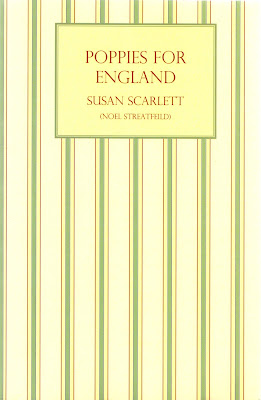If I were brave (or foolish) enough to look back at all of my previous announcements of forthcoming Furrowed Middlebrow titles, I know beyond a shadow of a doubt that each time I've said I was more excited than I had ever been before about our new titles. Surely by now you'd think my head would have exploded from overstimulation.
But I'm going to say it again this time, and I don't think you'll have any doubt that I'm telling the truth. This is the kind of announcement I've long dreamed of making. Previously unpublished novel by an author I adore and am so proud to have been able to get back into print? OMG indeed.
On my year end Furrowed Middlebrow Dozen a few months ago, my top spot went to a book I couldn't yet reveal. It had been a completely unexpected revelation to me, as I had received an email in mid-December from the heirs of one of my favorite Furrowed Middlebrow authors (they're all favorites, of course, but this one holds a special place for me indeed, as I know she does for many of you), with the news that a previously unpublished novel, long thought to have been lost, was now found, and would I like to read it?
Holy &@#$, yes please!
And far beyond the excitement I felt at reading a "new" novel from an author I loved was the realization, as I was reading, that it was bloody wonderful. I couldn't put it down, and as I reached the last chapter or two, I was in terrible suspense as to whether it could end as well as it had started. (It did.)
Yes yes yes, Furrowed Middlebrow, for heaven's sake, shut up and tell us what you're on about!
The book in question is...
The Marble Staircase, by none other than the incomparable and irresistible Elizabeth Fair.
[pause for suitable shrieks and exclamations]
 |
| The envelope in which the manuscript was discovered by Fair's heirs |
It's just oh so lovely. Shall I say just a bit about the plot? Twist my arm.
In the mid-1950s, Charlotte Moley, a widow who has long been a bit browbeaten by her grown daughter and very traditional mother ("Charlotte could be likened to grit in their smooth-running lives"), receives an unexpected inheritance from an old friend with whom she once spent idyllic holidays in Italy. The larger-than-life Mrs. Gamalion leaves her a house in the village of Nything (based, almost certainly, on Lytham in Lancashire, where the Fair family sometimes spent holidays), a bit the worse for wear but sufficient to awaken fantasies in Charlotte of leaving her old life behind and making a fresh start. As she explores the village and the house containing Mrs. Gamalion's belongings, memories of their times in Italy return...
I don't want to say too much, so I will simply add that when I described it to Rupert at Dean Street Press, in what was undoubtedly an annoyingly giddy, hyperventilating sort of email, I said it was like All Passion Spent crossed with The Enchanted April and filtered through the sensibility of Penelope Lively. You may, of course, describe it in your own way, and happily you will have the chance to do just that before too long, as we have bumped another planned title out of the way in order to release The Marble Staircase with our summer 2022 batch of titles (exact release date coming soon, along with announcements of our other summer titles, for which lingering contract revisions are flying back and forth as you read these words).
 |
| The opening paragraph of The Marble Staircase |
To add to this title's fascination, while first assumptions might be that The Marble Staircase was Fair's final novel, perhaps rejected by her publisher as times changed, snippets from Fair's diaries which were shared with me by her heirs suggest a more complex story. She mentions working on the novel (perhaps initially titled The Italian Legacy and, later, The Beautiful View) at least as early as January 1958, not long after the appearance of her fifth novel, A Winter Away, and more than two years before her final published novel, The Mingham Air, appeared. The longer-than-usual gap between the publications of Winter and Mingham may well suggest that Fair was initially at work on Staircase but that she was experimenting with different structures and alternative ways of telling her story.
Staircase is, structurally, a more complex novel than Fair's other work, with its shifts from the present time in Nything to Charlotte's shimmering recollections of the Italy of 25 years earlier. Fair's diary suggests that she initially planned to devote the first part of the novel to Charlotte's and Mrs. Gamalaion's time in Italy, and the latter part to Charlotte's present attempts at a new life, but she decided later that the two sections should be interwoven and allowed to resonate more fully with each other. A more challenging project, no doubt, and one that must have required considerable work and planning.
We have no evidence that Fair ever submitted The Marble Staircase to her publisher. Perhaps she remained unsatisfied with it, or planned to return to it for further revisions. Perhaps she felt it was taking too long and put it aside to write The Mingham Air. However, the manuscript we have is certainly complete, and however extensive the reworking and revising she had done, this is clearly a more or less final edit, with only minimal handwritten corrections of small errors. I'm obviously a bit biased, but if she did have lingering doubts about the success of her experiments, I can't imagine that many readers will share them.
Whew! I'm so relieved to be able to share this most exciting event at last, and I can't wait for you to be able to read and savor the book.









